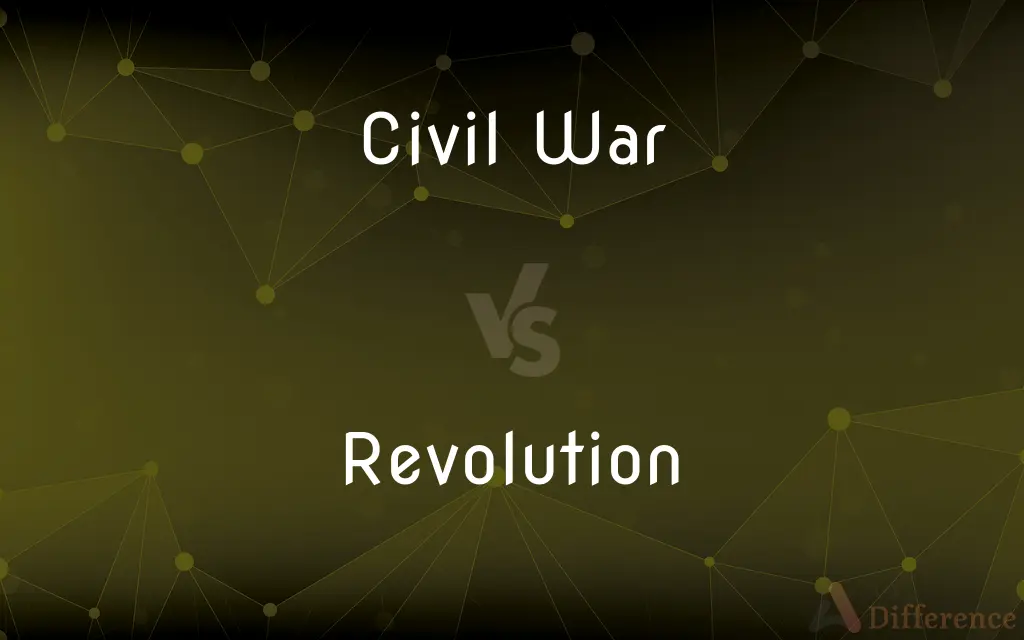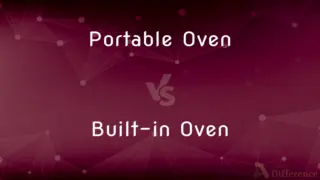Civil War vs. Revolution — What's the Difference?
By Tayyaba Rehman — Published on November 22, 2023
Civil War is a conflict within a country between organized groups; Revolution is an overthrow of a ruling power or system.

Difference Between Civil War and Revolution
Table of Contents
ADVERTISEMENT
Key Differences
Civil War is a violent conflict that arises between factions or regions within a country. It's often characterized by its intra-national nature, meaning it's contained within a single nation's borders. Revolution, on the other hand, pertains to the act of overturning or radically transforming a political or social order. It can sometimes involve violence, but not necessarily. While a Civil War highlights division and discord inside a nation, a Revolution aims at change, often by replacing an existing order or system.
Civil War can be seen as a symptom of unresolved societal tensions. When groups within a country cannot reconcile their differences through dialogue or institutional means, they might resort to violence. Revolution, however, often arises from a collective desire for change. It's typically fueled by widespread discontent against an existing regime or system, pushing people to seek fundamental transformations.
Civil War, by definition, focuses on civil or civilian entities within a country fighting against each other. It might arise from ethnic, religious, or political differences. Revolution, conversely, might involve civilians but is directed against a ruling authority or system, aiming to establish a new one. In this sense, a Revolution can be broader, potentially involving international actors or influences.
In essence, while both Civil War and Revolution involve conflicts, their nature and goals differ. Civil War emphasizes internal strife and fragmentation, whereas Revolution underscores change and transformation of a system or order.
Comparison Chart
Nature of Conflict
Intra-national conflict between factions within a country.
Overthrow or change of a ruling power or system.
ADVERTISEMENT
Key Participants
Groups within a nation.
Often the populace against a ruling power.
Main Goal
Resolve internal disputes or gain power within the country.
Establish a new order or system.
Duration
Can be short-lived or prolonged.
Can be sudden or evolve over time.
Outcome
May result in a united nation or further division.
Typically leads to a new political or social order.
Compare with Definitions
Civil War
Civil War arises from deep-seated internal disagreements or rivalries.
Economic and political differences can trigger a Civil War.
Revolution
Revolution is a radical change in political or social structures.
The French Revolution brought an end to the Bourbon monarchy.
Civil War
Civil War often sees citizens of the same nation pitted against each other.
During a Civil War, neighbors might find themselves on opposing sides.
Revolution
Revolution aims to establish a new governing system or ideology.
The Industrial Revolution introduced a new era of mechanization and industry.
Civil War
Civil War is a battle between organized factions inside a country.
The Spanish Civil War saw Republicans battling against Nationalists.
Revolution
Revolution can be peaceful or violent in nature.
The Velvet Revolution in Czechoslovakia was largely non-violent.
Civil War
Civil War results in significant societal and political upheavals within a nation.
The aftermath of a Civil War often demands rebuilding and reconciliation.
Revolution
Revolution represents the overthrow of an existing order.
The Russian Revolution of 1917 ended Tsarist rule.
Civil War
Civil War is an internal conflict within a nation.
The American Civil War was fought between the Northern and Southern states.
Revolution
Revolution often stems from widespread public discontent.
Oppressive regimes often face the threat of Revolution.
Revolution
Orbital motion about a point, especially as distinguished from axial rotation
The planetary revolution about the sun.
Revolution
A turning or rotational motion about an axis.
Revolution
A single complete cycle of such orbital or axial motion.
Revolution
The overthrow of one government and its replacement with another.
Revolution
A sudden or momentous change in a situation
The revolution in computer technology.
Revolution
(Geology) A time of major crustal deformation, when folds and faults are formed.
Revolution
A political upheaval in a government or state characterized by great change.
Revolution
The removal and replacement of a government, especially by sudden violent action.
Revolution
Rotation: the turning of an object around an axis, one complete turn of an object during rotation.
Revolution
In the case of celestial bodies, the traversal of one body along an orbit around another body.
Revolution
A sudden, vast change in a situation, a discipline, or the way of thinking and behaving.
Revolution
A round of periodic changes, such as between the seasons of the year.
Revolution
Consideration of an idea; the act of revolving something in the mind.
Revolution
The act of revolving, or turning round on an axis or a center; the motion of a body round a fixed point or line; rotation; as, the revolution of a wheel, of a top, of the earth on its axis, etc.
Revolution
Return to a point before occupied, or to a point relatively the same; a rolling back; return; as, revolution in an ellipse or spiral.
That fearComes thundering back, with dreadful revolution,On my defenseless head.
Revolution
The space measured by the regular return of a revolving body; the period made by the regular recurrence of a measure of time, or by a succession of similar events.
Revolution
The motion of any body, as a planet or satellite, in a curved line or orbit, until it returns to the same point again, or to a point relatively the same; - designated as the annual, anomalistic, nodical, sidereal, or tropical revolution, according as the point of return or completion has a fixed relation to the year, the anomaly, the nodes, the stars, or the tropics; as, the revolution of the earth about the sun; the revolution of the moon about the earth.
Revolution
The motion of a point, line, or surface about a point or line as its center or axis, in such a manner that a moving point generates a curve, a moving line a surface (called a surface of revolution), and a moving surface a solid (called a solid of revolution); as, the revolution of a right-angled triangle about one of its sides generates a cone; the revolution of a semicircle about the diameter generates a sphere.
Revolution
A total or radical change; as, a revolution in one's circumstances or way of living.
The ability . . . of the great philosopher speedily produced a complete revolution throughout the department.
Revolution
A fundamental change in political organization, or in a government or constitution; the overthrow or renunciation of one government, and the substitution of another, by the governed.
The violence of revolutions is generally proportioned to the degree of the maladministration which has produced them.
Revolution
A drastic and far-reaching change in ways of thinking and behaving;
The industrial revolution was also a cultural revolution
Revolution
The overthrow of a government by those who are governed
Revolution
A single complete turn (axial or orbital);
The plane made three rotations before it crashed
The revolution of the earth about the sun takes one year
Common Curiosities
Do Civil Wars occur within one country or between two countries?
Civil Wars occur within one country, between factions or regions of that country.
What is a Civil War?
A Civil War is an internal conflict within a nation between organized groups or factions.
How does the motivation differ between Civil War and Revolution?
While Civil War often arises from internal disagreements, a Revolution usually stems from a desire to overthrow an existing system or authority.
Are Revolutions always successful?
No, not all Revolutions achieve their goals, and some may be suppressed or co-opted by existing powers.
What's an example of a major Revolution in history?
The American Revolution in the late 18th century, which led to the independence of the United States from Britain, is a notable example.
What is a Revolution?
A Revolution is a radical change or overthrow of a ruling power or
Why do Civil Wars often result in long-lasting animosities?
Civil Wars pit citizens of the same country against each other, leading to deep-seated emotional and societal scars.
Can a Revolution lead to a Civil War?
Yes, a Revolution can create divisions within a country, leading to a Civil War if these differences are not reconciled.
Who are the usual participants in a Civil War?
Participants in a Civil War typically include different factions or groups within a nation, such as ethnic, religious, or political groups.
Can international parties play a role in a Revolution?
Yes, external actors can support, influence, or even instigate a Revolution, depending on their interests.
Which typically lasts longer: a Civil War or a Revolution?
It varies. While some Revolutions can be swift, others, like Civil Wars, can be prolonged.
How do Civil Wars and Revolutions impact a country's future?
Both can lead to significant societal, political, and economic changes, shaping a country's trajectory for years or even centuries.
Can a Revolution be peaceful?
Yes, some Revolutions, like the Velvet Revolution in Czechoslovakia, have been largely non-violent.
Can both Civil War and Revolution coexist in a country's history?
Absolutely. A country might undergo a Revolution, which subsequently leads to a Civil War, or vice versa.
Are Civil Wars more common in certain regions or eras?
Civil Wars can occur anywhere but may be more prevalent in regions with pronounced ethnic, religious, or political divisions.
Share Your Discovery

Previous Comparison
Portable Oven vs. Built-in Oven
Next Comparison
Siberian Husky vs. Alaskan MalamuteAuthor Spotlight
Written by
Tayyaba RehmanTayyaba Rehman is a distinguished writer, currently serving as a primary contributor to askdifference.com. As a researcher in semantics and etymology, Tayyaba's passion for the complexity of languages and their distinctions has found a perfect home on the platform. Tayyaba delves into the intricacies of language, distinguishing between commonly confused words and phrases, thereby providing clarity for readers worldwide.













































